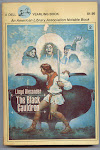This book points out the incredible similarities in the lives of Lord Byron and of Shakespeare (Edward De Vere, 17th Earl of Oxford). And the final, fateful difference that affected posterity's assessment of these two prodigies of English literature.
The difference was that Byron suffered (literally) early fame and an early death. While Oxford's great works were denied any sort of fame in connection with himself, throughout a comparatively long life of hiding his identity and perfecting his works.
"Until Thomas Looney unearthed Oxford, nothing at all was known about the author of Shakespeare, while Byron was one of the most highly publicized writers who ever lived." And, "Oxford and Byron were Gullivers in a land of Lilliputians." -- Hughes
Of Oxford's protagonist Biron, in Love's Labour's Lost, it was said, "Biron they call him, but a merrier man/ Within the limit of becoming mirth,/ I never spent an hour's talk withal./ His eye begets occasion for his wit."
Byron's family name was originally Biron, of Norman French origin. His first mistress was the wife of Lord Harley, a late earl of Oxford. Byron's last mistress wrote of him, "When he laughed the very air around him appeared to laugh."
Hughes' small book is filled with paragraph after paragraph--hundreds--of coincidences and similarities in the lives of these two poets and playwrights.
It's almost as if Byron's life was a morality lesson for Oxford, showing what might have been Shakespeare's reputation, had his early, unperfected writing brought him fame.
Edward De Vere, 17th Earl of Oxford, 1550-1604
George Gordon, Lord Byron, 1788-1824
Friday, July 26, 2013
Oxford & Byron, by Stephanie Hopkins Hughes
Posted by Joanne Cage --
Joanne Cage
at
2:37 PM
![]()
Labels: books, Byron, Oxford, Shakespeare
Subscribe to:
Post Comments (Atom)













1 comment:
I need to read more of his plays! I know it seems odd, but I've been too busy to sit down and think for the last month or two - need to work on that. :)
Post a Comment